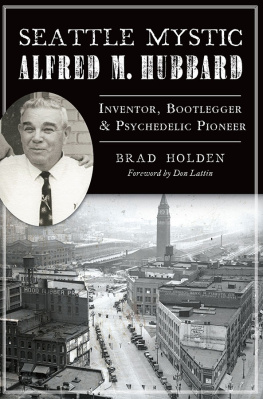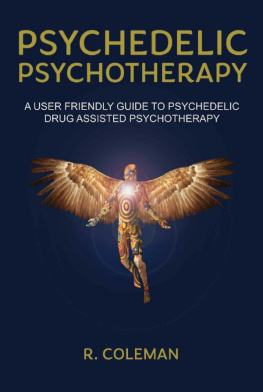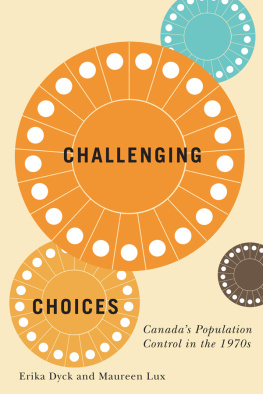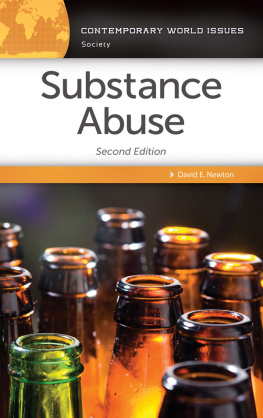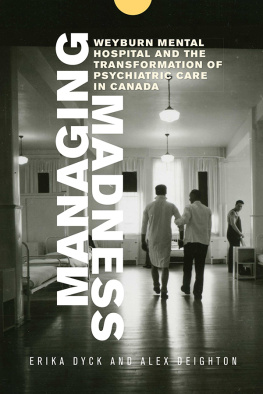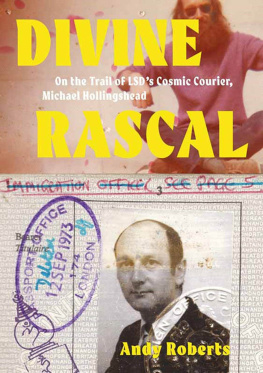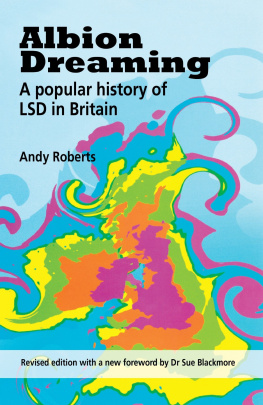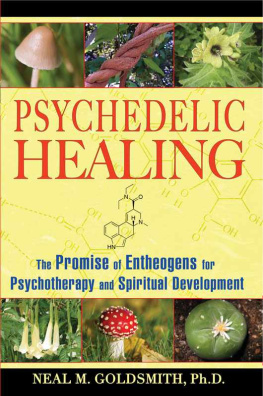Psychedelic Psychiatry
Psychedelic Psychiatry
LSD from Clinic to Campus
ERIKA DYCK

2008 The Johns Hopkins University Press
All rights reserved. Published 2008
Printed in the United States of America on acid-free paper
2 4 6 8 9 7 5 3 1
The Johns Hopkins University Press
2715 North Charles Street
Baltimore, Mary land 21218-4363
www.press.jhu.edu
Library of Congress Cataloging-in-Publication Data
Dyck, Erika.
Psychedelic psychiatry : LSD from clinic to campus / Erika Dyck.
p. ; cm.
Includes bibliographical references and index.
ISBN-13: 978-0-8018-8994-3 (hardcover : alk. paper)
ISBN-10: 0-8018-8994-4 (hardcover : alk. paper)
1. LSD (Drug)Therapeutic useHistory. I. Title.
[DNLM: 1. Lysergic Acid Diethylamidehistory. 2. History, 20th
Century. 3. Lysergic Acid Diethylamidetherapeutic use.
QV 11.1 D994p 2008]
RC 483.5.L9D93 2008
616.8918dc22 2007049668
A catalog record for this book is available from the British Library.
Special discounts are available for bulk purchases of this book. For more information, please contact Special Sales at 410-516-6936 or specialsales@press.jhu.edu.
The Johns Hopkins University Press uses environmentally friendly book materials, including recycled text paper that is composed of at least 30 percent post-consumer waste, whenever possible. All of our book papers are acid-free, and our jackets and covers are printed on paper with recycled content.
PREFACE
Since I began studying the history of LSD (d-lysergic acid diethylamide) I have often been struck by peoples reactions to my work. Some have asked me whether LSD is the drug that causes brain damage. Others have heard that it permanently alters chromosomes or that traces of the drug remain in the body forever, causing horrific flashbacks and making even one-time users into prime targets for failed drug tests. Many peoples perceptions of LSD are intimately linked with danger. People will casually say that they like to smoke marijuana once in a while or that they would consider taking ecstasy, but they would never try LSD. Some people have told me stories of someone who knew of someone who was permanently damaged after taking LSD, though few people have ever met such individuals. I remember hearing similar stories from my own friends while growing up, like the one about the guy someone knew who took too much LSD and believed he had been turned into an orange. He allegedly spent his days sitting alone fearing that someone was going to peel him. People who feel that the drug is dangerous usually assume that my investigations into the history of LSD will prove them right.
There are a lot of other people who take a different view. When I give presentations on the subject, invariably somebody approaches me afterward to tell me a story about one of his or her experiences with LSD. These people are, for example, professors, students, medical professionals, and psychologists. They all appear to be healthy, rational, and well adjusted. Sometimes they want to tell me about an amazing concert they attended while on acid, but then ask me whether they may have put themselves at risk of long-term effects. Others reminisce fondly about their experiences with the drug and believe that it had a very positive effect on their lives. Most of the people who make these confessions assure me that LSD changed them, that it was different from other drugs, and that the experience remains largely indescribable.
I am almost always asked about my own experiences with the drug. I suppose people think that only somebody who has tried LSD could have developed such an interest in the topic. Alternatively, they assume that somebody who spent years studying the history of the drug must have generated an overwhelming appetite for it. A lot of people ask me where they can get some. I do not know.
When I began my research into the history of LSD as a graduate student, I expected to uncover horror stories about irresponsible research experiments, addictions, and ruined lives. There is no doubt that some LSD consumption has had negative consequences and that some unethical experimentation with psychedelic drugs took place in clinical settings. But what I have since learned is that this is not, by any means, the whole story. I had the opportunity to closely examine the records of a large set of experiments conducted in Canada in the 1950s. I was surprised to learn that the psychiatrists involved in these experiments went to extraordinary lengths to study the drug before giving it to patients and even tested it on themselves first. There is no question that the patients volunteered for LSD treatments.
Although I had access to patients files from these early experiments, research ethics agreements stipulated that I could not contact any of the people named in these files, nor could I include their names in any publications. However, word spread about my investigation and former patients began to contact me themselves. This very small number of individuals who had been treated with LSD forty years earlier added a crucial perspective to my study. When we think about taking LSD as a treatment we may think about it as being a very risky endeavor. These people explained to me some of the circumstances that led to their participation in the trials as alcoholics. Alcoholism had affected their families, jobs, and bodies, their whole lives, so profoundly that they were prepared to try anything to find a solution. One former patient explained that he would have walked through fire if he thought it would help him stop drinking. They all remained loyal to the psychiatrists who gave them LSD. Of course, I was not in a position to follow up with all the patients who had been treated in this way. The testimonies I did manage to collect, though not necessarily representative, contribute an important perspective that is not found in the textual records.
In addition to the patients who took LSD, I also heard from former graduate students, nurses, psychiatrists, psychologists, and architects who were involved in the experiments. Many recounted stories about taking LSD with various caveats or claims ranging from But I only took it once, to try and understand what my patients/subjects might expect to The stuff is harmless.... I probably took it a hundred times, the first summer. Many of these people were octogenarians when I met them, which should call into question concerns about the long-term effects of the drug.
How should we reconcile these findings with the connection that continues to exist in the public mind between LSD and danger? This book is the result of my quest to understand this dichotomy.
ACKNOWLEDGMENTS
I am indebted to many people for financial, material, and emotional support during this project; all of its weaknesses, of course, are mine alone. Friends and colleagues Larry Stewart, Valerie Korinek, Cyril Greenland, Cara Pryor, Jennifer Milne, Jason Kleinermanns, Nadine Charabin, Steve Hewitt, and Tristan Fehrenbach were there from the very beginning. David Wright, Ken Cruikshank, Stephen Heathorn, Marcel Martel, Dick Rempel, Stephen Streeter, and all the members of the History Department at McMaster University helped me transform a mere germ of an idea into the premise for a book. The encouragement and support from the Johns Hopkins University Press eased the transition of this project into its current form, and Im especially grateful to my editor, Jackie Wehmueller, for her unwavering support, and to the copy editor, Anne R. Gibbons, for her careful review.
Arriving at the University of Alberta in 2005, I was welcomed by a wonderful community of scholars who have become mentors and friends: Susan Smith, Pat Prestwich, Lesley Cormack, Beverly Lemire, Dawna Gilchrist, David Cook, Cressida Heyes, Rob Wilson, and Sarah Carter. I have drawn strength and inspiration from an exceptionally talented and generous group of friends: Angela Graham, Jessa Chupik, Greg Stott, Carrie Dickenson, Jennifer Keelan, Charles Barbour, Mike Haan, Sean Gouglas, Chris Fletcher, Biella Coleman, Kathleen Lowrey, Jonathan Reinarz, and Patrick Barber.
Next page




